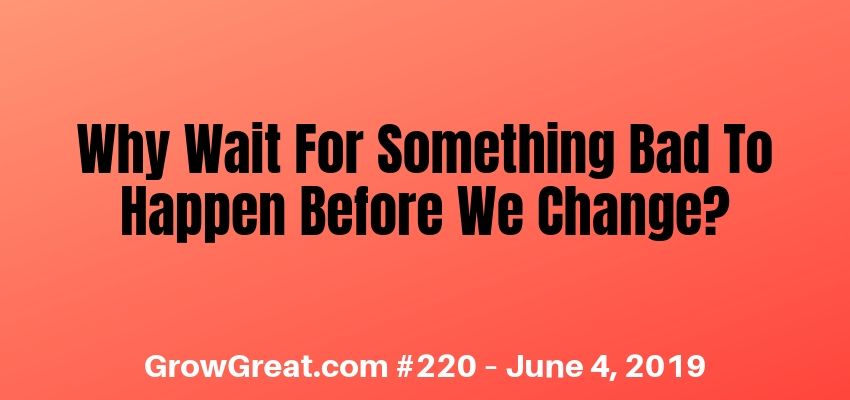Podcast: Play in new window | Download (Duration: 9:39 — 11.5MB)
Subscribe: Apple Podcasts | Spotify | RSS | More
It’s true in our lives and in our businesses. We make adjustments – changes and improvements – when something isn’t working very well. Usually, when things aren’t working at all or when something is truly broken.
Within an hour of arriving at the office, Jeff has Katherine sitting across from him. She’s been his executive assistant for three years. And she completely changed his life when she arrived. Her efficiency and organization helped him perform at levels he used to dream about. Everybody knows how valued she is to his operation.
Right now, he’s a nanosecond away from panic mode. Katherine has handed him her resignation and two-week notice. She’s moving to accept a new challenge. Jeff never imagined this would happen. He’s pleading with her and asking, “Is there anything I can do to change your mind?”
She’s sheepish, but mostly just wanting this day to be over. That and the next 2 weeks. Her excitement to begin the new journey of her life trumps whatever dread she’s now enduring.
Jeff gets angry. First at Katherine. Then at himself.
“I’ve taken her for granted for so long,” says Jeff. “I just assumed everything was great because it was great for me.”
A year earlier Katherine asked Jeff about an opening in his company. It was in marketing – something Katherine had told Jeff during her first interview was an area of interest. He forgot. And when the opening appeared he dismissed it as not being a good opportunity for her. “You’re learning much more with me,” Jeff told her.
But that wasn’t the point. Her happiness was the point. Jeff’s happiness blinded him to Katherine’s happiness. And now it’s too late. Well, it’s too late for Jeff to hang onto a key employee whose absence will dramatically alter his life. But it’s not too late for Jeff to learn – and change.
We all experience moments and events that seemingly force us to change or do something different (hopefully, something better). A long-term landlord raises the rent drastically on a new lease proposal. A supplier hits us with a 15% price hike. A key employee resigns. A major customer leaves us for a competitor. These events impose on us. So we face them.
Why wait until these things happen?
Why not deploy our creativity and improvement when things are going well?
Mostly because we don’t think about them until we have to. That’s our mistake. It’s human nature I suppose, but that doesn’t mean we have to accept it.
What if today we decided to change our intentions? Jeff wishes he had been more intentional in helping Katherine achieve her goals – and simultaneously avoiding the disruption his life is now experiencing.
Scenario planning doesn’t require the scenario to be current. Or real.
What if Jeff decided it would be to his advantage to think about Katherine’s career goals and happiness? How can Jeff behave more intentionally with not just his executive assistant, but with all employees to see that they’re engaged in work that means something to them? Work that might keep them on the team longer because it works for them – and the company?
What if you thought about your next lease renewal months in advance? What if the landlord hits you with a substantial rate increase? Plan for it now in advance of it happening.
What if you lost one of your biggest customers? Don’t wait until they walk out the door before you figure out what went wrong. Why not dive into their account (and their happiness) now? In fact, why not do that with all your top customers — the ones who compose the bulk of your revenues?
Psychologists have long known that humans typically need to be metaphorically grabbed by the lapels before we make a change. It’s that hitting rock bottom, having a pigpen moment (parable of the prodigal son) and all the other cliches that happen to be true.
Some years ago psychotherapist Amy Morin wrote an article for Forbes, “Change Doesn’t Happen Overnight: It Happens In These Five Stages.”
Ms. Morin lists these 5 stages:
- Precontemplation
- Contemplation
- Preparation
- Action
- Maintenance
Each step builds on the prior. If you’re in pre-contemplation you’re not accepting responsibility for the need to change. You’ve got to get to the contemplation stage where you recognize the consequences of not changing. But you still must do more. So you move to preparation where you actually plan to make the change. The better the plan to change, the more likely the change will stick.
All of this is to move us toward action. This is where behavioral change finally starts. And let’s not forget the final stage because it can be the make-or-break phase, maintenance. Too frequently we quit just a few days in because we declare victory too soon. The temptation to think we’ve changed enough is strong. Eating healthy for a few days isn’t nearly long enough to establish a lifestyle change that will stick. Don’t quit the actions to change too soon.
Sit down with yourself. Where are you in these stages of change? Get yourself where you need to be so you can reach new heights of achievement and accomplishment.
Then, sit down with your leadership team. Discuss where you all are, as individuals and as a collective. Get your entire team – and your organization – where you need to be so you can blow the doors off of whatever past or current success you’re experiencing.
Be well. Do good. Grow great!
Randy
